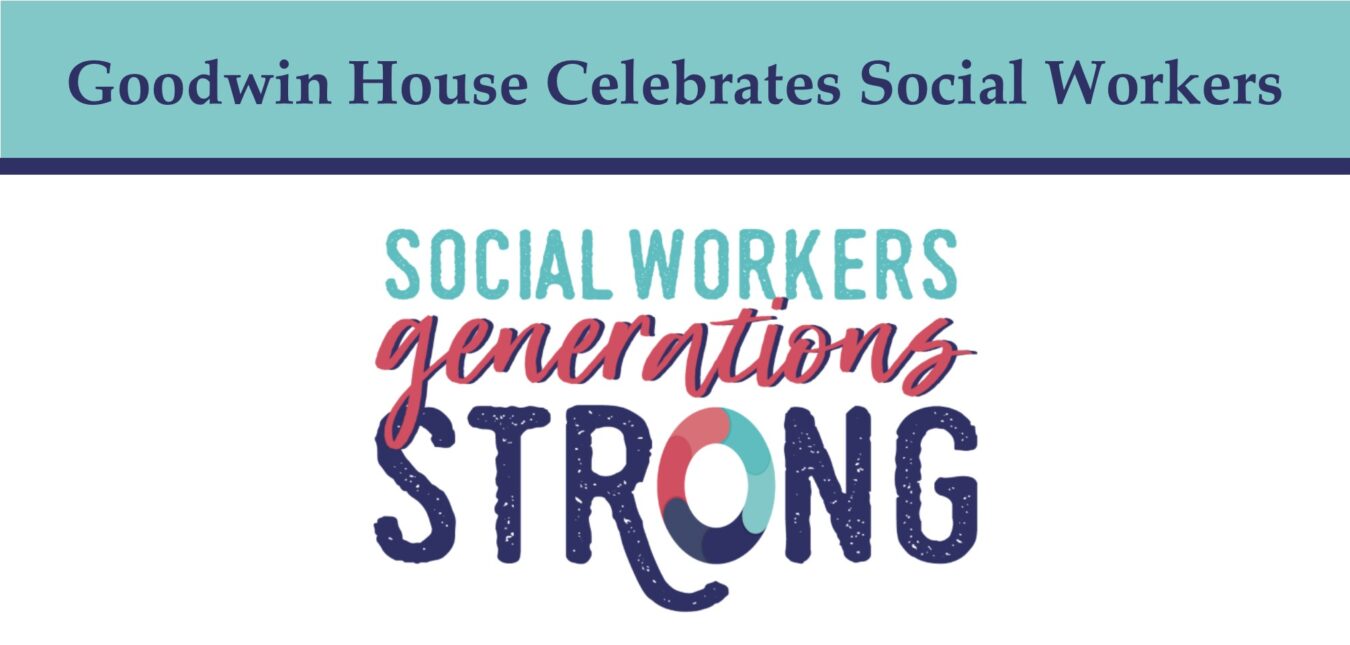Goodwin Living Celebrates Social Workers’ Essential Services to Older Adults and Their Loved Ones
by Amanda Ranowsky
March is National Social Work Month, a 31-day celebration of social workers in America. In 2018, there were more than 700,000 social workers in the United States, with that number expected to increase 11% by 2028. In honor of this month, we want to recognize the social workers who are part of our Goodwin Living teams. We shine a light on the incredible work they do for older adults and the people who care for them.
The Role of Social Workers
Most of us have probably only heard of social workers in particular settings: adoption, foster care or perhaps working with the homeless or the rehabilitation of inmates. In truth, social workers play an important role across a wide spectrum of fields.
Social workers also provide a long list of services. At its core, the role of a social worker is to help their clients to cope with the challenges in their lives. This might involve providing psychotherapy, coordinating care and researching local and national resources that might be available. Many caseworkers and mental health assistants hold a Bachelor of Social Work (BSW) degree, but social workers in clinical positions are required to have a Master of Social Work (MSW) degree. A Licensed Clinical Social Worker (LCSW) obtains additional certifications above the MSW that equip and allow them to provide more extensive services, such as diagnosing and treating mental, behavioral and emotional disorders.
Social Work at Goodwin Living
At Goodwin Living, our social workers are responsible for the coordination of care required to meet the needs of our members, residents and clients. Their specific duties vary. Social workers for our Life Plan Community (LPC) residents will offer slightly different services than social workers who serve our Goodwin Living At Home members. Our hospice social workers also have their own unique offerings. It is extremely beneficial for older adults and their loved ones to understand the role and value of social workers so they can benefit from their expertise and their commitment to the older adults they serve.
Social Workers in Life Plan Communities
LPC social workers work with residents at all levels of living—independent, assisted living, memory support and nursing care. LPC social workers provide emotional support, counseling, resources, problem solving and overcoming challenges as the residents move through their daily lives and the stages of aging. They help with navigating transitions, whether it’s the resident’s first move to the community or one to another level of living.
When older adults face significant transitions, they are at risk of suffering “transfer trauma” as they adjust to a new home and new way of life. To help residents through these moments, Goodwin Living social workers organize meet-ups and support groups around different challenges such as caregiving or Alzheimer’s. They also work with our residents’ families to help them as they care for their loved one.
“By having a dedicated social worker at each level of living,” explains Barbara D’Agostino, Executive Director of Goodwin House Alexandria, “residents and families have the specific support they need through any transition, at any stage of life.”
Social Workers in Goodwin Living At Home
Social workers play a key role in our innovative age-in-place program, Goodwin Living At Home (GLAH). They serve as Member Services Facilitators (MSF), the cornerstone of the program’s benefits. GLAH social workers work with members to develop plans for the future, and they provide care coordination wherever the member may be located – the home they have lived in for most of their lives, of the Goodwin Living LPCs, another LPC, Assisted Living, Nursing Center, or a home out of state.
While an LPC social worker usually focuses on supporting residents at a specific level of living, a GLAH social worker works with members no matter their level of need or care wherever they live. Through our GLAH Member-Only number, GLAH Members know they can call 24/7 to speak their MSF who is there and ready to meet their needs.
“Our Member Services Facilitators are the lifeblood of our program,” says GLAH Executive Director Karen Skeens. “They’re there to help members plan ahead, and they are there to put those plans into action to meet their needs. They develop trusting relationships and engage with members regularly to ensure they stay safe and happy in the homes they love.”
Social Workers in Hospice
For Goodwin Hospice, a big part of the social worker’s job is providing bereavement services. They offer individual grief counseling, facilitate grief support groups and routinely check in with family, friends and caregivers after their loved one has passed.
In addition to servicing the Northern Virginia community, our hospice social workers offer bereavement services for Goodwin Living residents and staff. Sometimes, they will reach out to residents from Goodwin House Bailey’s Crossroads and Goodwin House Alexandria after a sudden loss. They’ve organized meetings where staff can come together and remember deceased residents.
“Bereavement counseling is a standard part of the care we provide,” explains Goodwin Hospice Executive Director Cindi Carney. “Our bereavement counselor stays in touch with loved ones for a year after their loss. We do what we can to support them as they mourn.”
Special Thanks!
The social workers at Goodwin Living provide essential services that are very meaningful to our community. We thank each and every one of them for the selfless, affirming work they do for us every day.
Several of our social workers offered advice for staying healthy and engaged during this difficult time. Click here to read and benefit from their advice. (link)
Thank You to Our Social Workers At Goodwin House Bailey’s Crossroads!
- Barbara Fornoff, LCSW, Director/Residential Living
- Aaron Zajdel, LCSW, Supervisor, Assisted Living
- Kristin Salzer, MSW, Health Care Center
Thank You to Our Social Workers At Goodwin House Alexandria!
- Monica Hutchins-Thomas, LCSW, Director/Residential Living
- Logan Wallace, MSW, Health Care Center
- Barbara Bolin, LCSW, Assisted Living
Thank You to Our Social Workers At Goodwin Hospice!
- Kathleen Buday, LCSW ( Supervisor for hospice now)
- Anne Van Heyste, MSW, Hospice
- Kathy Durham, MSW, Hospice
- Marcia Baumgartner, MSW, Hospice
Thank You to Our Social Workers at Good House at Home!
- Elizabeth Robinson, LCSW
- Priscilla Leysath, MSW
- Lauren Bradley, MSW
Thank You to Our Social Worker at Virginian Home Health Services!
- Lauren Kipfer, MSW
————————————-
As Marketing & Communications Specialist, Amanda Ranowsky partners with colleagues throughout Goodwin Living to tell our stories and raise brand awareness. From printed collateral to digital marketing, Amanda covers many bases. Before joining GHI, Amanda worked for a small, family-owned business where she gained experience in content marketing. Amanda’s creative expression extends beyond the office. She is an active member of community theater and chorus groups.





